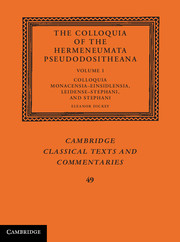Commentary
from Commentary
Published online by Cambridge University Press: 05 May 2013
Summary
Title Logos/Liber is found at the head of all the M manuscripts except T and thus clearly goes back to the M archetype (if not earlier); it is traditionally omitted from editions, however, because of editors’ preferences for the readings of T. No trace of this title is found in the E manuscripts, which offer no consensus on a title but most of which have an ascription that in some way attributes the work to Iulius Polydeuces (Pollux). There is no trace of this ascription in the M version, and it is clearly false (cf. Schoenemann 1886: 3–4; Goetz 1892: xx, xxi), so it is likely to have been added by the adaptor of the E version. This type of invention was not uncommon at the time, and Pollux’s name was wrongly attached to other works as well; see Kresten (1969, 1976).
ia ἀγαθῇ τύχῃ, εύτυχϖς/bona fortuna, feliciter: These are invocations for the success of the literary enterprise; similar invocations (ἀγαθῇ τύχῃ. θεοὶ ἵλεοι/bona fortuna. dii propitii) are found at the end of the preface to the colloquium Montepessulanum (Mp 1d). In both languages the use of such invocations at the start of a text is a characteristic of inscriptions; in Greek it goes back to the classical period, and in Latin (where bona fortuna often becomes simply BF) it seems to be an imitation of the Greek found mainly in the third and fourth centuries ad (see Adams 2003a: 81).
- Type
- Chapter
- Information
- The Colloquia of the Hermeneumata Pseudodositheana , pp. 133 - 184Publisher: Cambridge University PressPrint publication year: 2012

